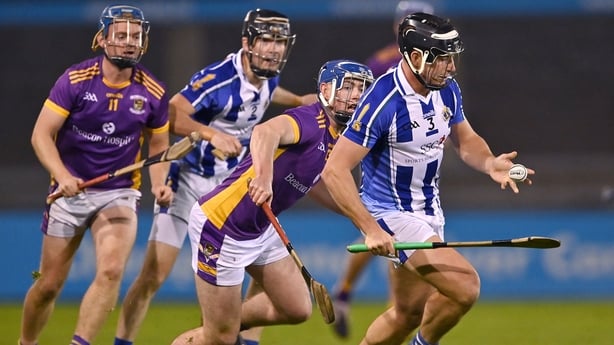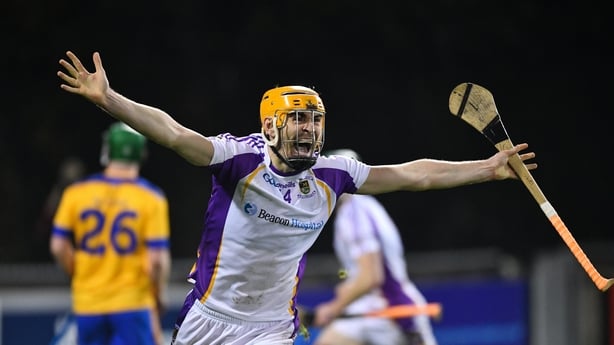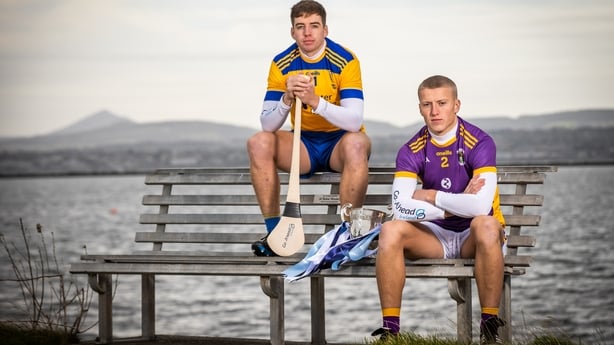Brian Sheehy is a proud standard-bearer for a fading GAA tradition.
Just as motorway plazas have eroded the appeal of homemade 'hang sangwidges' and thermos flasks of tae, the increasing demands of senior Gaelic games have made dual players a rarity.
Last Sunday, Sheehy was an unused substitute as Kilmacud Crokes retained their Dublin SFC crown against Na Fianna. This weekend, he is expected to play a bigger role as the Stillorgan club aim to seal the 'double double', again against Na Fianna, whose hurlers they also beat in last year’s decider.
"I wouldn't be doing it if I didn't enjoy both," he told RTÉ Sport, speaking before the football final.
"I’m passionate about the sport, passionate about GAA. I’ve always played football and hurling. Probably a bit of stubbornness in me as well. Why should I have to quit one when I enjoy playing both? I know that in practical terms it’s very tough but I have equal love for football and hurling.
"I think they are special games, they’re made to be played by a dual player. Years ago there always was, especially in Dublin. I want to keep it going as long as I can.
"For every club player, it’s a huge commitment. I train as much as any other lad would because I do 50% with the hurling and 50% with the football. So it’s the same as every club player, I’m no different that way.
"It’s tough because you’re only training 50% of the time. If there’s a lad who only plays football training all the time, how do you justify starting ahead of him when he’s at all the sessions and you’re not? Every training I go to, football or hurling, I’m only going to one a week. There’s extra pressure to perform at that session compared to the lad that has two chances that week. I only have one chance.
"I’m in a very demanding college course at the moment, science at UCD, which is pretty much full-time. So you’re going to college and training three times a week. Then you’re trying to juggle other things like relationships, family, socialising, which is obviously a big part of college.
"It's tough, especially playing for a bigger club because the standard is so high on both sides. I wouldn’t be playing much football now, and I’m probably disappointed on a personal level, with my game time in the football. But it is in the championship and it's great to be part of the squad.
"I enjoyed those nights out as much as any of the lads who started. That’s the whole part and process of being a part of the squad and the team. You win together and you enjoy it together. You’re still part of both panels and you are training in both."

Sheehy, a Leinster Under-20 hurling finalist with Dublin last year, says he has repeatedly been advised to focus on one code or the other but he would like to see clubs make more of an effort to accommodate dual players instead.
"There’s always that worry of being caught in between the two stools. But I’m very passionate about being a dual player and I think that it’s a lovely thing to be able to do in the GAA and have groups of friends in either team," he said.
"I am conscious that I am the only one at Kilmacud Crokes and I want kids looking up and thinking ‘there’s someone there’, even if I’m not playing both. But ‘he’s there so I can do it when I’m older’. I think that’s very important that I can inspire the next generation that it can be done.
"There are people who would say to me ‘Why don’t you train more with the hurlers because you start more with them?’ but you have to give that equal commitment to both. If you’re going to do it, you’re going to have to show respect and give an equal commitment to both no matter what, if you’re starting or even if you’re not in the 26. That's very important.
"I’m extremely lucky to have the two co-managers of the hurlers [Kieran Dowling and Donal McGovern] and Baggio [Robbie Brennan] with the footballers. They’re in constant communication the whole time and are watching my load. Lucky for me they are both sound out about it.
"I played football and hurling the whole way up and I don't think I need to quit one, at the moment anyway, as I'm enjoying both. As long as it is still feasible and as long as the managers are both happy about it I'll keep going."
Each individual club has to have a template for how a dual player can work
Is he surprised more players don’t play both?
"I’m not. To do that in the club you have to be of exceptional quality. We [Kilmacud] had Ross O’Carroll in the past, who has doubled in both codes. The standard is so high on both sides, that if you are a young lad coming out of minor and you want to make it on one team, you have to give it to that team pretty much, unless you are a phenomenal player.
"Look at [Conal] Keaney for Ballyboden. Obviously, there are large numbers at Crokes compared to down the country, so it is probably more difficult in a big club to do both.
"[Loughmore-Castleiney’s] achievement was fantastic last year. Their double got much more attention than Crokes’ did because of all their dual stars. They obviously don’t have the same numbers. It was a special achievement and great to see. You look at Slaughtneil, they’re really the standard-bearers for how a dual club can be run. So you have to look to them and take inspiration from them.
"It’s very tough. I think it comes back to the club. Each individual club has to have a template for how a dual player can work. Each mentor for each underage team has to promote it underage. It’s not like people are playing hurling and football till minor then quitting one. People are quitting much younger, there are different sports involved.
"Communication between both sets of management is very important to keep everyone on board."

Last year was Na Fianna’s first appearance in the Dublin hurling final and they led by nine points with 10 minutes to go only for Kilmacud to force extra-time and eventually win by seven in a spectacular comeback.
"To be honest, I thought it was gone," said Sheehy, who played the whole game at full-back.
"With ten minutes to go, Donal Burke got that second goal and I wanted the ground to swallow me up. I wanted to get out of Parnell Park as fast as I could. But then that’s just sport. Things happened and momentum changed. That’s a huge thing and we got a run at them.
"[Ronan] Hayes got those two goals at the end, and we never looked back. It is one of the most amazing games that I have been a part of. It made it that extra bit special to win it that way.
"It probably made the [All-Ireland] football final easier for me to take in a weird way. That was sport, comebacks happen and that’s why we love it. Dramatic things happened and at the end of the day nobody has died. The hurt is still there, but I have been on both sides of it. We enjoyed them, so we went again for the next day.
"It’s a good achievement for Na Fianna to be in both. I know they haven’t been in a football final for 15 years or so and the hurlers obviously got to their first final ever last year.
"It’s definitely an up-and-coming club and we’ll probably have a good few more battles in the future. So as long as we can keep them down as long as we can, stop them coming up, I think that’s the main goal."

It’s the first time since 1971 that the same two clubs have met in both Dublin county finals. Na Fianna will hope that the pattern follows that of 41 years ago when Craobh Chiaráin lost to St Vincent’s in the football but then beat them in the hurling.
"Obviously, at the time, it was a tough one to take," says Dublin star Burke of last year’s final reversal to Crokes.
"Once the games started back, it's a new kind of journey. Different lads come in, different players are there. You just have to move on and you can't be thinking about the past the whole time. We just started a new leaf, turned over a page and we just went at it this year again then.
"They're probably the pinnacle of Dublin hurling at the moment. The champions, and they're probably the best team at the moment. It will be a big test now, but we're looking forward to it.
"It would mean a lot now [to win]. To me, it would be to win it with my friends. Lads I grew up with, that would be the most satisfying thing for me.
"But the bigger picture, I'd say it would mean a hell of a lot to lads like Jimmy Gray who founded the club, he's still coming to all the games. Even the coaches, growing up all the people that were involved with my age group as well. The old teams, the people who are up on the wall that are still helping out with the club, cutting pitches and are still involved. It would mean a hell of a lot more for them. That would be a big motivation for us."
Watch the Leinster Football Club Championship Round 1 game, Palatine (Carlow) v St Patrick's (Wicklow), on Saturday from 7.45pm live on RTÉ2 and RTÉ Player


